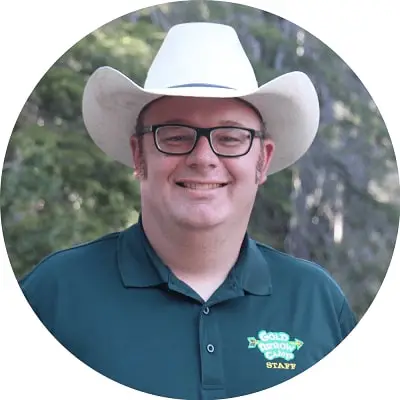Salary, Job Description, How To Become One, and Quiz
What is the job like

My job title is Camp Director and Chief Fun Officer for Gold Arrow Camp. Gold Arrow Camp is a traditional children’s summer camp in Lakeshore, California. We’ve been having fun in the Sierra National Forest since 1933.
My Typical Day
My key responsibilities as a camp director are the often conflicting desires for fun and safety. Safety is job number one, which means sometimes I have to be the bad guy (no, you can’t practice your WWE wrestling moves on your cabinmates) and that’s really important to us as a camp. If campers and staff are not physically and emotionally safe then there will be no growth, and growth is really what we’re about. Fun comes second. That said, I get paid to drive around camp with disco lights, a fog machine, and music blasting from the back of our golf cart, so that’s pretty fun!
Summer
During the summer my typical day is never typical. The schedule is the same:
6:30AM: Meeting before breakfast at 7:15.
7:15-8:30AM: Hanging out, talking to campers and staff at breakfast, meeting with people who I need to have one-on-one conversations with.
9:00AM: Leading our morning assembly. We play games (lots of old “minute to win it” style games), tell jokes, dress in dumb costumes, and start the day that way.
9:30-noon: I’m either making parent calls (calling parents who have called or emailed to check on their campers), driving a van with kids to go backpacking, rappelling down a waterfall, or to our island outpost on another lake, or being out in camp watching activities run and talking to campers and staff.
Noon-1:30PM: It’s lunch and chatting with campers or meeting with staff.
2:00-5:00PM: Same as the 9:30-noon block.
5:00-6:30PM: Dinner.
6:30-7:45PM: Wandering around camp, fixing broken things, and talking to campers and staff.
7:45-9:00PM: I’m either in the office dealing with things that went wrong (behavior problems, staff issues, answering emails, reading evals, etc.) or going from campfire to campfire to hear about kids’ days.
9:00-11:00PM: Time for office work and checking in with our middle managers (program heads and head counselors) or running our staff meeting.
Off-season
In the off-season, my job responsibilities are hiring our staff of more than 150 counselors, supervisors, and support staff, getting them on-boarded, getting visas for our international staff (who are participants in a cultural exchange program (J-1 summer camp counselor and J-1 summer work travel programs) and doing pre-arrival training.
I’m also overseeing things like staff training, calling parents to answer questions, updating our website, recording our podcast (the Gold Arrow Camp POG-Cast), editing video for our social media channels, shopping for supplies, sending gifts to our camp families, and a thousand other little tasks that pop up.
My day to day in the off-season is much simpler. I go to the office from 8-5 most days and work on whatever is on my list. A lot of that list looks familiar to people in more traditional jobs (I have meetings and interviews and read a LOT of emails), but you work the 9 months of off-season for the 3 months of camp.
Pros
- No day is the same as the day before
- I get paid to have fun
- I get to live and work in nature
- I get to watch kids really discover what their best self is, and see them grow and change, which is really cool
Cons
- Just like when I taught, you can’t just turn off this job at the end of the day. We run a resident (sleepaway) camp, so if something happens in the middle of the night, my walkie talkie is on my bedside table
- The job makes it hard to do “normal” things like take a summer vacation
- We relocate our entire family for the summer. That’s hard
- Pay in the industry is lower than if you were managing in a more corporate environment
Advice to aspiring Camp Directors
I think for those who would like to become a Camp Director the best advice I can give is to start working at a camp, and then to pursue education in either education, child development, mental health majors, or business. Camps are businesses, and every camp needs someone who can do the business side of things.
Don’t know which career to pursue?
Take the career quiz to find careers that match your personality type.
Take The Career Quiz






